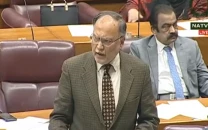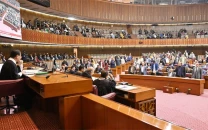India’s limited war option
India will much likely continue funding its proxies in Pakistan while intensifying its diplomatic assault on Pakistan

Indian Prime Minister Narendra Modi and Prime Minister Nawaz Sharif. PHOTO: REUTERS
India incapable of waging war on Pakistan, experts say
War of words
Have the politicians leading the government upped the ante for war whimsically without consulting the strategic minds and the men in uniforms? It seems so, for Delhi’s armed-to-the-teeth military still needs significant advance planning, the enemy’s capability determination, accurate target coordinates along with a fail-proof spy network behind the battle lines, and last but not least an aggressive diplomatic campaign in influential capitals, to carry out the threat.
Launching strikes inside Pakistan or initiating a military excursion using army, navy and air force should not be a problem for the world’s third largest military. Such an action may also cause a sharp spike in public approval of Modi government’s decision. But the major issue will be the outcome of crossing the Line of Control, or even violating the sovereign airspace which rests on India’s objective behind the move. Is it only to punish the alleged non-state perpetrators of the Uri attack or penalise Pakistan itself? The other fundamental question remains India’s capacity to zero in the target precisely and eliminate them in the shortest possible timeframe and with the least cost.
Rewind to the Mumbai attacks in 2008 when India alleged Pakistan-based outfits planned and executed the series of terror attacks. A similar rant of surgical strikes inside the country and limited engagement along the Line of Control was mulled over. All options including the nuclear ones were considered but a diplomatic avalanche was fancied. Indian reaction to the attack on Indian parliament in 2001, which was blamed on Pakistan’s ISI, was similar. Operation Parakram (valour, in English language) resulted in amassing of troops and other military assets along the international border, but India lacked the will to cross the border.
A death move
India will be risking an all-out war instead of the drummed up limited one. The option of using Indian gunship helicopters or air dropping commandoes is suicidal. Although the Indians see Muridke, the headquarters of banned Jamaat-ud-Dawa, as a solid target for such surgical strikes, is Delhi ready to strike beyond Azad Kashmir? Leave aside the probability of success in the hot pursuit; the response to this from Islamabad could be anything but restraint.
‘India will not attack Pakistan or AJK’
There is little clarity as to how ‘limited’ this war will be from Islamabad’s perspective. Will Pakistan deal with an Indian excursion in Azad Kashmir as a limited conflict or a full-scale war? Strategists in India have not been certain about the prospects of a limited war with Pakistan for years. Given the grandiloquence of Modi’s promise, the chances for a Kargil-like incursion are negligible.
Is India ready to react?
When it comes to India’s much fantasised and fancied Cold Start military doctrine, which spells out multiple conventional strikes against Pakistan, it can harm the country enough to not necessitate a nuclear retaliation. Besides mobilising other resources, two brigades (some 5,000 troops) have been relocated from Southern Kashmir to the Line of Control since the Uri attack while India's elite strike forces are on the final leg of a forward deployment. The standardised theoretical military response involves India’s multi-pronged limited, rapid attacks against conventional military assets. Delhi has drilled along similar lines in May 2001 with Operation Vijayee Bhava and Sudarshan Shakti exercise in 2011.
To operationalise the Cold Start Doctrine, India not only needs flawless initiation of hostilities with smooth inter-force coordination but also active diplomatic support from the US and its allies. Modi had already launched a pre-requisite campaign vital for the doctrine of branding Pakistan an epicentre of terrorism. The bid will deny Pakistan diplomatic and moral support from other influential capitals.
Modi government has been actively engaged in isolating Pakistan regionally and globally long before the Uri incident. The Balochistan reference was an all-out signal for India’s assets in Pakistan as well as its allies aboard. The ‘epicentre of terrorism’ mantra has, however, been damaged after Delhi admitted its support for the ilk of Brahamdagh Bugti.
Pakistan won’t cower to threats, Nisar warns India
Pakistan’s response so far has been very explicit. The arm-laden fighter jets’ takeoffs and landings from motorways, mobilisation of other vital military resources and launch of a diplomatic offensive on the sidelines of UN General Assembly and elsewhere have exposed Indian plans to realise the Cold Start.
With the Rafale deal hastily approved the other day, the Indian air force is devoid of the desired air superiority over its Pakistani counterpart. Evidently, there are no options available with Delhi bordering on ‘good’ to appease the RSS cheerleader. The sabre-rattling may not satisfy Modi’s electoral, but fruitless if not humiliating incursion will cost him more dearly in every sense of the word. India will much likely continue funding its proxies in Pakistan while intensifying its diplomatic assault on Pakistan.
Naveed Ahmad is a Pakistani investigative journalist and academic with extensive reporting experience in the Middle East and North Africa. He is based in Doha and Istanbul. He tweets @naveed360.




1724486955-0/Untitled-design-(12)1724486955-0-208x130.webp)














COMMENTS
Comments are moderated and generally will be posted if they are on-topic and not abusive.
For more information, please see our Comments FAQ